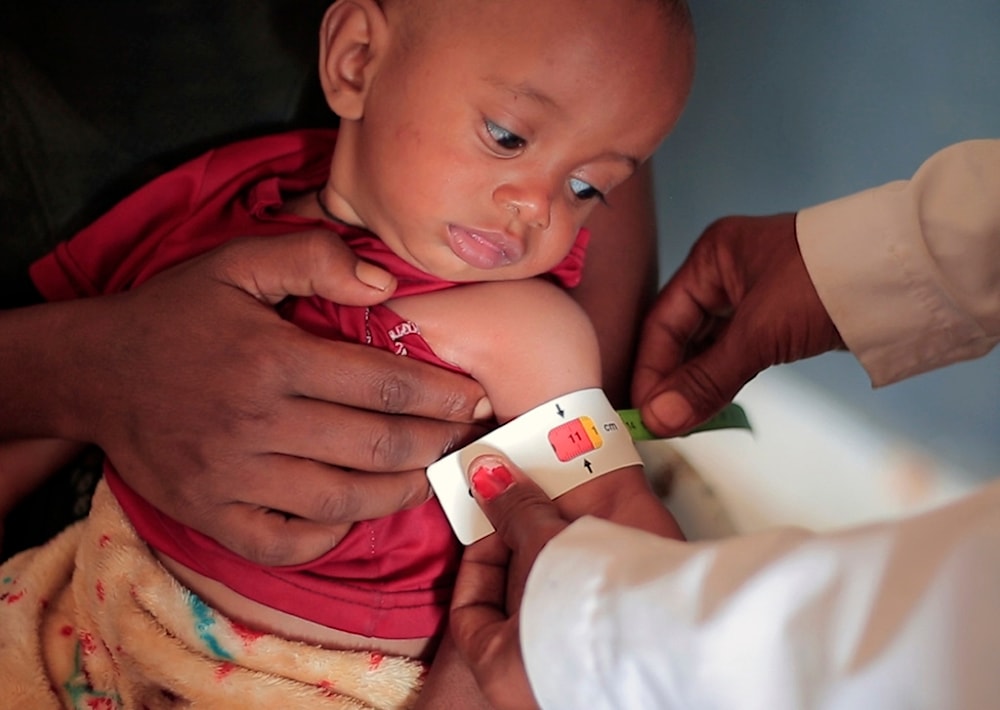WFP to suspend aid for 650,000 in Ethiopia amid growing crisis
The agency noted that food and cash assistance for up to one million refugees is also at risk of being discontinued by June.
-

In this image made from video, a nurse measures the arm circumference of Temesgen Muluhaw, 8 months old, who is suffering from malnutrition, at the Finarwa Health Center in Mai Mekden, in the Tigray region of northern Ethiopia, on Tuesday, February 27, 2024 (AP)
The World Food Programme (WFP) announced Tuesday that it will suspend nutrition assistance for 650,000 malnourished women and children in Ethiopia, starting in May, due to a critical funding shortfall. The agency warned that millions more are at risk of losing access to life-saving support if additional funding is not urgently secured.
"WFP is being forced to halt treatment for 650,000 malnourished women and children in May due to insufficient funding," the agency stated. "WFP had planned to reach two million mothers and children with life-saving nutrition assistance in 2025."
Ethiopia is currently facing a worsening humanitarian emergency, with over 10 million people suffering from hunger. The country is grappling with the lingering effects of the 2020–2022 Tigray civil war, which claimed an estimated 600,000 lives and displaced around one million people. Compounding the crisis are ongoing armed conflicts in the Amhara and Oromia regions, severe drought in the Somali region, and an influx of refugees fleeing violence in Sudan and South Sudan.
Conflict and insecurity are severely limiting humanitarian access. According to the WFP, it has been unable to reach over half a million vulnerable people due to ongoing violence, especially in the conflict-affected northern regions.
Read more: Funding cuts drying up aid for malnourished children, UN says
WFP Country Director Zlatan Milisic confirmed the depth of the crisis, stating, "We've been left no choice but to this week suspend treatment for 650,000 malnourished women and children — simply because we've run out of commodities and funding."
The agency noted that food and cash assistance for up to one million refugees is also at risk of being discontinued by June. "If additional funding is not received and the number of people fleeing violence in South Sudan continues," the agency said, aid operations will be halted.
Aid crisis
The situation has been further aggravated by major cuts in global aid flows. The OECD reported a 7.1% decline in international development assistance between 2023 and 2024—the first drop in six years. Adding to this pressure, US President Donald Trump issued a three-month freeze on all foreign aid in January 2025, as part of broader austerity measures that have disrupted humanitarian programming worldwide.
The WFP is currently facing a $222 million shortfall for its operations in Ethiopia from April to September 2025. Without immediate donor support, the agency warns that the humanitarian situation, already dire, could deteriorate rapidly.
"I think this is an important time to remind the world and our donors and others that the humanitarian situation in Ethiopia is not very good, and it's actually going to deteriorate," said Milisic. As conflict, climate, and political constraints converge, the WFP has issued an urgent appeal for funding to continue delivering assistance to Ethiopia’s most vulnerable populations.

 3 Min Read
3 Min Read









